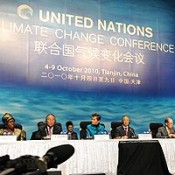REDD+ Partnership Feels the Heat as Climate-Change Talks Begin in Tianjin
Most Parties to the UN Climate-Change Convention agree that we can slow climate change in the short term by saving tropical rainforests and reducing greenhouse gas emissions from deforestation and forest degradation (REDD). They don’t however, agree on how to finance that reduction in a fair and equitable way. The REDD+ Partnership is supposed to unveil its proposals this week.

Most Parties to the UN Climate-Change Convention agree that we can slow climate change in the short term by saving tropical rainforests and reducing greenhouse gas emissions from deforestation and forest degradation (REDD). They don’t however, agree on how to finance that reduction in a fair and equitable way. The REDD+ Partnership is supposed to unveil its proposals this week at Climate-Change talks in China.
4 October 2010 | Negotiators from all 194 Parties to the United Nations Framework Convention on Climate Change (UNFCCC) are meeting this week in Tianjin, China. It’s the last major meeting before year-end talks in Cancun, and officially they’re trying to iron out technical issues and overcome differences between developed and developing nations.
The real news, however, may be coming from the REDD+ Partnership, which is meeting in a parallel track in close cooperation with the UNFCCC.
The Two Official Tracks
Differences between developed and developing nations were institutionalized in 2006, at talks in Bali, which split negotiations into two tracks. One track, the Ad Hoc Working Group on Further Commitments for Annex 1 Parties under the Kyoto Protocol (AWG-KP), focuses on tweaking the existing Kyoto Protocol. The other, the Ad Hoc Working Group on Long Term Cooperative Action under the Convention (AWG-LCA) , focuses on creating a completely new protocol to replace Kyoto once it expires in 2012.
The two tracks were supposed to converge in Copenhagen, but each has instead taken on a life of its own. Generally speaking, developing countries support the AWG-KP, under which they have no obligations, while developed countries support the AWG-LCA, which aims to bring developing countries into the process.
Because Reduced Emissions from Deforestation and forest Degradation (REDD) was not included in the Kyoto Protocol, its role in policy is discussed in the AWG-LCA, which formed a “subsidiary body”, the Subsidiary Body for Scientific and Technological Advice (SBSTA), to discuss the technical aspects of REDD. Under the Kyoto Protocol, industrial countries can write off emissions captured through Land Use, Land-Use Change, and Forestry (LULUCF) against their industrial emissions. Because LULUCF is covered by the Kyoto Protocol, talks take place in the AWG-KP track.
The Copenhagen Accord recognized the need to create funding mechanisms for REDD+, a contentious concept that combines REDD with biodiversity protection and safeguards for local livelihoods. By some definitions, REDD+ also incorporates aspects of LULUCF.
The REDD+ Partnership
As negotiations stalled, Norway took the lead in establishing the REDD+ Partnership, which aims to develop funding mechanisms that will complement evolving UN procedures. In June, the Partnership released its interim partnership agreement, and co-chairs Junya Nakano of Japan and Federica Bietta of the Coalition for Rainforest Nations told Ecosystem Marketplace that they would spend the summer developing financing schemes and working on a plan that incorporates the needs of indigenous people.
Since then, however, details have been hard to come by, and scores of indigenous rights groups say they’ve been excluded from the process, while a Partnership spokesperson says it’s the groups that have shunned the process.
Either way, the Partnership is holding its own meeting parallel to formal negotiations this week, and promises to address critics before the event wraps up on Saturday.
Indeed, as the week progresses, it’s likely that more attention will focus on the REDD Partnership proceedings than on formal negotiations – even as UNFCCC Executive Secretary Christiana Figueres spoke of a growing convergence between the two tracks, but seemed intent on tempering enthusiasm.
“The agreements that can be reached in Cancun may not be exhaustive in their details,” she said. “But as a balanced package they must be comprehensive in their scope and they can deliver strong results in the short term as well as set the stage for long term commitments to address climate change in an effective and fair manner.”
Additional resources
Please see our Reprint Guidelines for details on republishing our articles.

